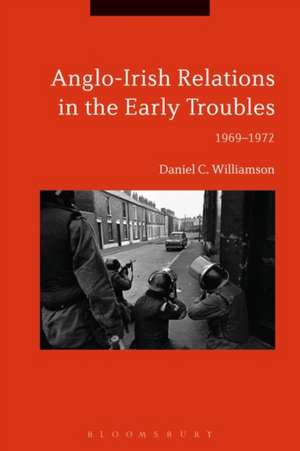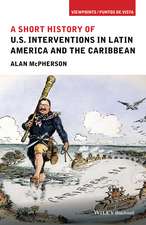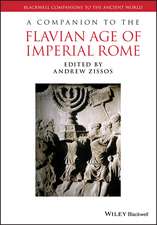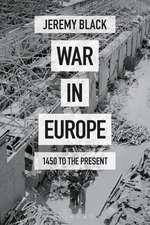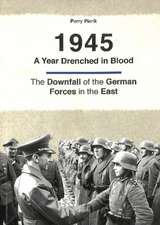Anglo-Irish Relations in the Early Troubles: 1969-1972
Autor Dr Daniel C. Williamsonen Limba Engleză Hardback – 30 noi 2016
Toate formatele și edițiile
| Toate formatele și edițiile | Preț | Express |
|---|---|---|
| Paperback (1) | 238.94 lei 6-8 săpt. | |
| Bloomsbury Publishing – 27 iun 2018 | 238.94 lei 6-8 săpt. | |
| Hardback (1) | 772.58 lei 6-8 săpt. | |
| Bloomsbury Publishing – 30 noi 2016 | 772.58 lei 6-8 săpt. |
Preț: 772.58 lei
Preț vechi: 1112.22 lei
-31% Nou
Puncte Express: 1159
Preț estimativ în valută:
147.83€ • 154.36$ • 122.07£
147.83€ • 154.36$ • 122.07£
Carte tipărită la comandă
Livrare economică 16-30 aprilie
Preluare comenzi: 021 569.72.76
Specificații
ISBN-13: 9781474216968
ISBN-10: 147421696X
Pagini: 264
Ilustrații: 12 bw illus
Dimensiuni: 156 x 234 x 2 mm
Greutate: 0.45 kg
Editura: Bloomsbury Publishing
Colecția Bloomsbury Academic
Locul publicării:London, United Kingdom
ISBN-10: 147421696X
Pagini: 264
Ilustrații: 12 bw illus
Dimensiuni: 156 x 234 x 2 mm
Greutate: 0.45 kg
Editura: Bloomsbury Publishing
Colecția Bloomsbury Academic
Locul publicării:London, United Kingdom
Caracteristici
Analyses the early, formative years of the conflict, which were instrumental in shaping its long-term course
Notă biografică
Daniel C. Williamson is Associate Professor of History at the University of Hartford, USA. His previous publications include Churchill, Eisenhower, and Anglo-American Relations, 1953-55 (2006).
Cuprins
Introduction: The Roots of the Troubles1. The August Crisis: Reactions to the Outbreak of the Troubles2. A Search for Moderation: Dublin and London Seek Common Ground3. A Change at Downing Street: Heath Comes to Power and the Troubles Intensify4. From Bad to Worse: From the Fall of Chichester-Clark to Internment5. Anglo-Irish Summitry: The Chequers Meetings and their Aftermath6. The End of Stormont: From Bloody Sunday to Direct RuleConclusions: Anglo-Irish Diplomacy and Northern IrelandBibliographyIndex
Recenzii
[A] valuable work of diplomatic history on British-Irish relations during the first phase (1969-72) of the Troubles, the three decades of violent conflict in Northern Ireland. This detailed narrative based on archival research and secondary sources traces the communications and interactions-private and public, high and low level-between the British government headed first by Harold Wilson and then by Edward Heath and the Irish government of Jack Lynch as they responded to the growing crisis in the North. Summing Up: Highly recommended. Upper-division undergraduates and above.
[A] careful study . [with] extensive quotation from official memoranda.
Daniel C. Williamson's study offers a nuanced analysis of British-Irish relations from the outbreak of the Troubles in Northern Ireland in the summer of the 1969 to the collapse of the Ulster Unionist controlled Stormont government in March 1972. Based on an assortment of archival and secondary sources, the book provides a micro-analysis of relations between the British and Irish governments and more generally the political and paramilitary forces in operation in Northern Ireland from 1969 to 1972. This book is recommended, not merely for the academic community, but for anyone interested in modern Anglo-Irish relations and the Northern Ireland Troubles.
Anglo-Irish Relations in the Early Troubles shows, clearly and compellingly, how events in Northern Ireland during the late 1960s and early '70s shaped the often contentious diplomatic relationship between London and Dublin. Analyzing how other political considerations-both domestic and international-influenced the two governments' policy decisions regarding Ulster, Williamson is particularly effective at assessing the efficacy of different strategies pursued by Irish and British officials and at demonstrating where his own work fits into the existing scholarship on Northern Ireland. The years covered here were pivotal ones, as decisions made between 1969 and 1972 set the stage for each subsequent development in the search for peace and stability in the North.
Engaging, fast-moving and lucidly written, Dan Williamson's scholarly, accessible and authoritative account of Anglo-Irish relations in the early years of the Northern Ireland Troubles is diplomatic history at its finest. Williamson provides a fresh view, based on impeccable archival research and a masterly knowledge of the topic, of one of the most difficult and tense periods of British-Irish relations. He places the international reaction to the collapse of Northern Ireland into violence in 1969 firmly in the Dublin-London-Washington nexus. His focus internationalises the early years of the Troubles and places the descent into a generation of violence in Northern Ireland in a vital global context. The book is a 'must-read' for all interested in late-twentieth century Irish history and the outbreak of the Troubles.
[A] careful study . [with] extensive quotation from official memoranda.
Daniel C. Williamson's study offers a nuanced analysis of British-Irish relations from the outbreak of the Troubles in Northern Ireland in the summer of the 1969 to the collapse of the Ulster Unionist controlled Stormont government in March 1972. Based on an assortment of archival and secondary sources, the book provides a micro-analysis of relations between the British and Irish governments and more generally the political and paramilitary forces in operation in Northern Ireland from 1969 to 1972. This book is recommended, not merely for the academic community, but for anyone interested in modern Anglo-Irish relations and the Northern Ireland Troubles.
Anglo-Irish Relations in the Early Troubles shows, clearly and compellingly, how events in Northern Ireland during the late 1960s and early '70s shaped the often contentious diplomatic relationship between London and Dublin. Analyzing how other political considerations-both domestic and international-influenced the two governments' policy decisions regarding Ulster, Williamson is particularly effective at assessing the efficacy of different strategies pursued by Irish and British officials and at demonstrating where his own work fits into the existing scholarship on Northern Ireland. The years covered here were pivotal ones, as decisions made between 1969 and 1972 set the stage for each subsequent development in the search for peace and stability in the North.
Engaging, fast-moving and lucidly written, Dan Williamson's scholarly, accessible and authoritative account of Anglo-Irish relations in the early years of the Northern Ireland Troubles is diplomatic history at its finest. Williamson provides a fresh view, based on impeccable archival research and a masterly knowledge of the topic, of one of the most difficult and tense periods of British-Irish relations. He places the international reaction to the collapse of Northern Ireland into violence in 1969 firmly in the Dublin-London-Washington nexus. His focus internationalises the early years of the Troubles and places the descent into a generation of violence in Northern Ireland in a vital global context. The book is a 'must-read' for all interested in late-twentieth century Irish history and the outbreak of the Troubles.
